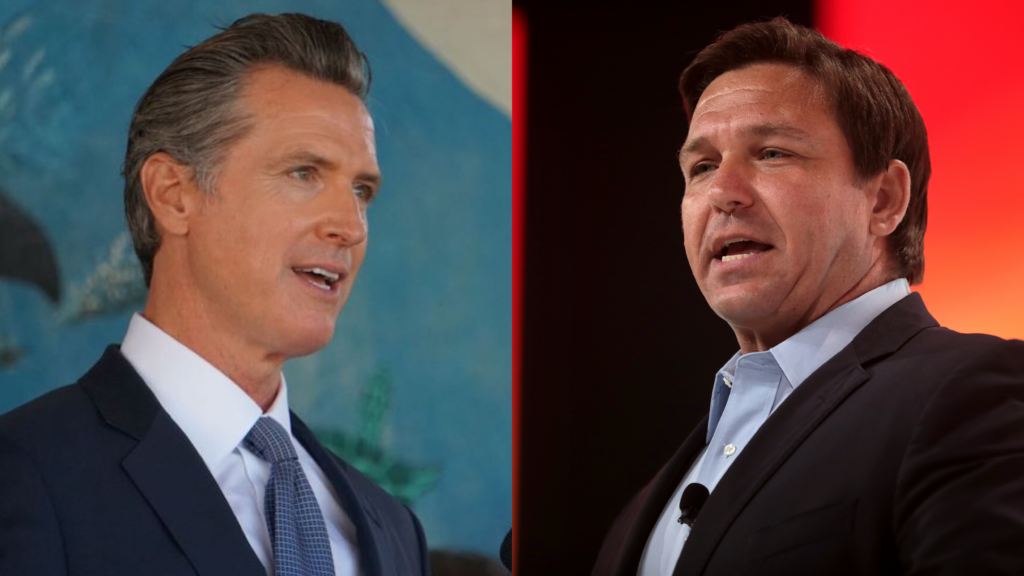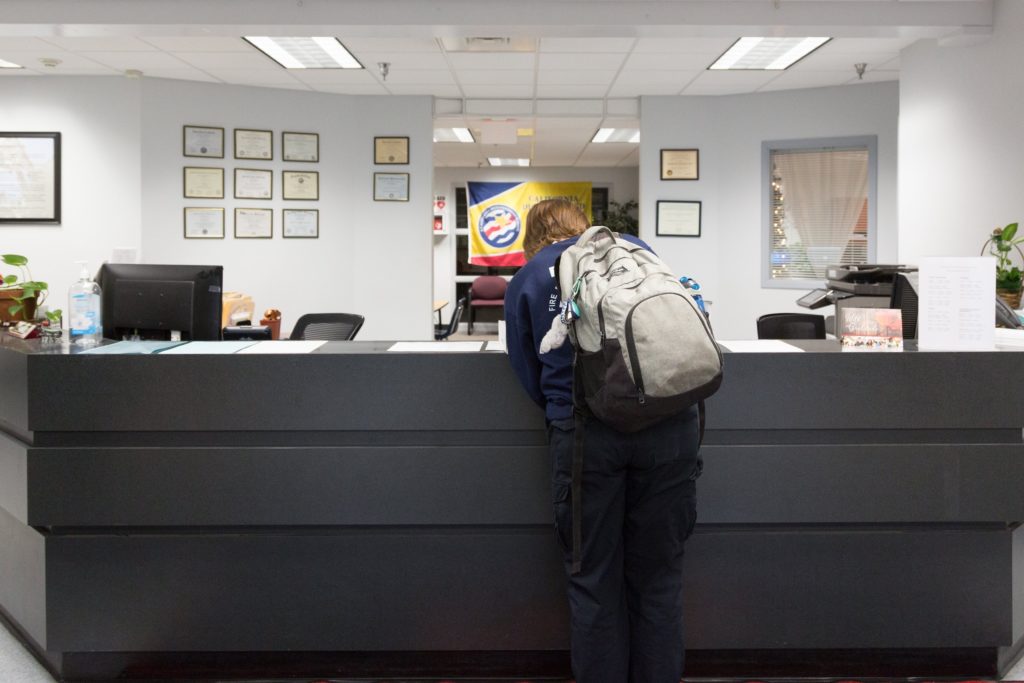
Gov. Gavin Newsom (left) and Florida Gov. Ron DeSantis (right).
Credit: Andrew Reed / EdSource & Gage Skidmore/Flickr
There’s a saying in politics that most people will vote for the candidate they’d rather have a beer with. I’ve been thinking about this a lot after hearing that California Gov. Gavin Newsom and Florida Gov. Ron DeSantis agreed to a televised debate.
Personally, I’m dreading it. Our national political discourse has already degenerated below the World Wrestling Entertainment (WWE). It’s impossible to escape the constant fighting in the press, social media and text chains of family and friends.
I think it’d be more interesting if Gavin and Ron had to explain their views on a topic like education over drinks. I started to imagine what it would be like to be stuck between them in my local bar.
They were already there when I walked in. DeSantis was dressed in his Navy intelligence officer uniform. He was nursing a vodka soda and kept furtively scanning the crowd for threats. Newsom was in the seat to my left and halfway through an expensive wine that he’d obviously brought with him.
Both were staring at the local news on TV. When it started playing a story about the learning that kids had lost during the pandemic, DeSantis pointed at the screen and said, “That’s what happens when your politicians let teachers’ unions shut down schools for two years. In Florida, we prioritized our kids and parents.”
Hearing this, Newsom snorted and said, “In California, we prioritized safety. Florida ignored the science and made dangerous decisions that put everyone at risk.”
“What a load of crap,” said DeSantis. “We had just about the same mortality rates and kept our schools and businesses open. You kept them closed and forced people to wear masks long after everyone got vaccinated.”
“At least we believed in vaccination,” yelled Newsom. “You guys were taking deworming pills for horses.”
I laughed at the joke and said to Newsom, “You’re right. The anti-vax, horse deworming pills and other conspiracy lunacy kept us from getting back to normal.” Then I turned to DeSantis, “But you’re right that California, like many blue states went overboard with school shutdowns and severely damaged kids’ learning and mental health. The state and local leaders who should have advocated for those students, especially the most vulnerable ones, did nothing and that should forever stain their consciences.”
Newsom looked shocked that I wasn’t in total agreement with him. After all, Californians, especially those in the Bay Area, are only supposed to think one way. His silence inspired the DeSantis to start another line of attack. “Truth is, it wouldn’t matter if they’d kept the schools closed. The kids in them weren’t learning anything anyway. Florida is in the top five nationally in reading and math and our kids were years ahead of California students before the pandemic. That’s why so many of your parents are leaving your state and choosing ours.”
Newsom took a huge slug of red wine and snorted, “Our kids learn what your kids aren’t allowed to like ethnic studies and African American history. We teach the truth. You whitewash it.”
I looked to my left and raised a toast. “Great line,” I said. “But he,” pointing to my right, “has another good point. We are way behind Florida and many other states in teaching reading and math. They’ve been at this work for years. We don’t even have a state-wide reading and math strategy. I think it’s amazing that we have an ethnic studies requirement but what’s the point if our students can’t read the books that tell our nation’s story, good and bad?”
DeSantis downed his vodka soda and pumped his fist.
I held up my hand, “But that doesn’t excuse Florida for forcing publishers to change books anytime its Republican politicians don’t like something and telling folks that they can’t use the words diversity, equity or inclusion if they want to work in schools.”
Newsom piled on. “Don’t forget that Florida teachers can’t say the word gay before third grade!”
DeSantis looked furious. “Of course, they can say gay,” he said. “What they can’t do is have any discussions of sex before third grade or indoctrinate them into critical race theory, so they hate their country and white people. Our anti-woke agenda is overwhelmingly supported by parents and voters in Florida and nationally.”
“It’s just more censorship,” said the Newsom. “You deny the reality of our nation’s history and human sexuality.”
I complimented Newsom for another good line and then said to DeSantis. “You make some good points. The language police are miserable, self-righteous scolds and the CRT people clearly overreached by describing every white person as privileged and racist. Parents should know what their kids are being taught in the earliest grades, but there’s a difference between talking about sexual acts and describing family structures that include gay and lesbian parents. You seem hellbent on delegitimizing those.”
“And don’t forget how they treat transgender people. That’s even worse,” said Newsom.
“So, we should let them play women’s sports?” said DeSantis.
“Yes. And use the bathroom of the sex they identify with,” said Newsom.
“Hold on,” I said. “I think that most people agree that letting transgender males play women’s sports is unfair. But there appears to be active effort to deny their existence as human beings, which just seems cruel,” I said. “Who cares about how they identify or what bathrooms they use?”
This seemed to make them equally angry. They turned away from me, which was fine because I’d had enough of being stuck in the middle. As I paid for my beer, I wondered what I’d do if I had to choose between these guys in an election.
I mostly leaned to the left, but Newsom hadn’t shown political courage when many urban school districts refused to open many months after mass vaccination, nor done much to improve teaching and learning; but he said all the right things.
On the right side, DeSantis had prioritized students and families during the pandemic and his students were doing much better academically; but everything he did came with a dose of 1984 and a whiff of Voldemort.
Then there was the fact that neither of them drank beer.
What kind of choice is that?
•••
Arun Ramanathan is the former CEO of Pivot Learning and the Education Trust—West.
The opinions expressed in this commentary represent those of the author. EdSource welcomes commentaries representing diverse points of view. If you would like to submit a commentary, please review our guidelines and contact us.







